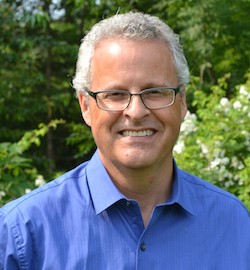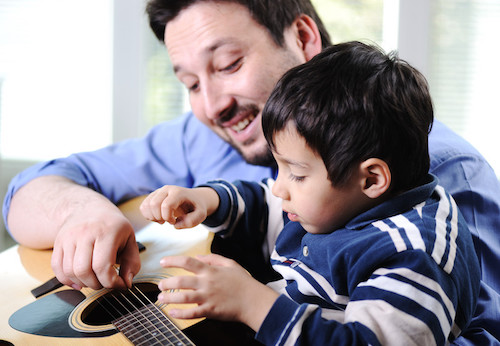If there are children in your life — if you have children yourself, or you work in a school, or you come into regular contact with nieces, nephews, and their friends — you know that music usually plays an important role in their day-to-day lives. Children seem to always be singing, dancing, or skipping to a beat, and you don’t have to tell them to do so. It’s part of who they are.
Lately there has been a lot of media attention regarding children and the notion of unstructured play. In a nutshell, the theory is that allowing children to play freely without telling them what or how has longterm positive effects. Adults are happier and generally more together if they were, in their childhood years, able to have lots of free time to use their imaginations without suggestions or guidance from grownups.
But there is a tendency for adults to structure the lives of their children, and this applies to their kids’ experiences with music. So even at preschool ages, the grownups are often worrying that they aren’t doing enough to ensure that their children are learning musical skills. This results in a push to get kids into piano lessons, dance classes, preschool choirs, and many other structured musical activities even before the age of 5.
I don’t want to throw cold water on those very good intentions, because I think any musical activity is time well spent. But there is a way to help steer the children in your life toward being a musician, possibly even a songwriter, by simply guiding their unstructured musical play.
In effect, rather than telling kids what they’ll be doing for their musical activity, you simply join in with the music they’re already doing, and guide gently from the background. Today’s successful songwriters can generally point back to unstructured musical experiences they had as children as being a crucial component of their current level of musical success and enjoyment.
Here are some suggestions that I believe will set your children up for success in music as they get older:
- Comment on the music they’re listening to. Spontaneous comments on their music shows them that music is something that provokes observations and thought (“This song is loud!“), and opinions (“I really like the drum beat in this song..”). It’s an unobtrusive way to guide their listening.
- Play your own favourite music, and tell them what you like about it. Play the music that you’ve loved all your life and tell them why you love it. Don’t ask them if they like it too… that’s not so important. But if they say “I don’t like it,” ask them why, and always show respect for their opinions.
- Show young children how to keep a beat. You’ll be amazed at how readily most children will move to music. With very young children, you can take their hands and clap them together with the beat. Allow them to do it on their own as well, and don’t despair if their beat doesn’t match the music. It’s a skill they’ll eventually learn, and don’t worry if it takes a long time.
- Improvise random musical shapes at a piano or keyboard, and invite the child to improvise along with you. Try to react musically to the ideas they try. If they play a flurry of loud, short notes, create similarly shaped shapes as a kind of musical response.
- Listen to classical music and invent a story to go along with it. Classical music is good to use for this activity, particularly music by Claude Debussy, Maurice Ravel, Igor Stravinsky, or other composers whose music seems to be guided by emotions. You’ll be amazed at how quickly children will put their imaginations to work, and will create their own stories as they hear the music change. If you want a good piece to use with this activity, listen to the 3rd movement from Ravel’s “Mother Goose Suite.” Don’t worry about what the music is really about… make up your own story as you hear the music change. (“Now the robin is calling to all the other birds to come join the party…”, “Now the rabbits all begin to dance…” — that sort of thing.)
The purpose of this post is not to imply that there is anything wrong with structured music lessons for your children. I simply want to indicate that the most important thing you can do for your children is to play music for them and with them, and that if you haven’t placed your child in music classes, you most certainly have not missed the boat!
I do emphatically believe that the most important musical activity for children is listening combined with reacting to music. And this can be done very successfully at a young age in a largely unstructured way.
 Written by Gary Ewer. Follow Gary on Twitter
Written by Gary Ewer. Follow Gary on Twitter
 Get “The Essential Secrets of Songwriting” 10-eBook Deluxe Bundle. Take your songwriting to a new level of excellence! Includes “Writing a Song From a Chord Progression” – a step-by-step guide for starting the songwriting process with chords. GET THE DELUXE BUNDLE DEAL.
Get “The Essential Secrets of Songwriting” 10-eBook Deluxe Bundle. Take your songwriting to a new level of excellence! Includes “Writing a Song From a Chord Progression” – a step-by-step guide for starting the songwriting process with chords. GET THE DELUXE BUNDLE DEAL.











Great to see your encouragement for early-learning through play, Gary. I agree. Children are tomorrow’s writers & musicians, so the foundational experiences they have determine the quality of music in the future, and their joy in it.
I have specialised in this field all my life, working on both government resources that are issued free to New Zealand schools, and on albums for our own small, independent record company – Universal Children’s Audio – (www.ucamusic.com).
If your readers are interested, UCA has many award-winning albums that foster the values you shared today. Many come with free-download books which contain the lyrics and ‘activity’ notes (or teaching notes, depending on one’s outlook). These empower and inform both parents and teachers as to how to implement simple, play-based ideas and activities with the children … (as it is not necessarily easy for parents to come up with such guidance out of the blue).
I hope this is helpful. All the best for your excellent service. As a songwriter, I have enjoyed following your blog for quite a while now. Good on you!.
Many thanks for your comment, Radha, and for the information regarding children’s music resources. Very helpful!
-Gary